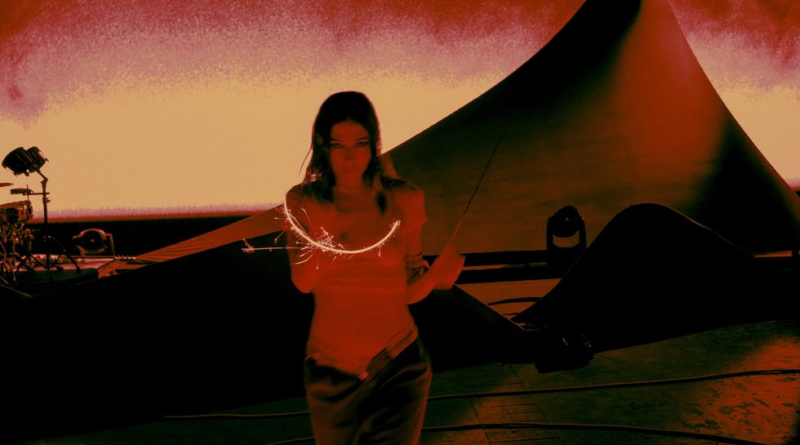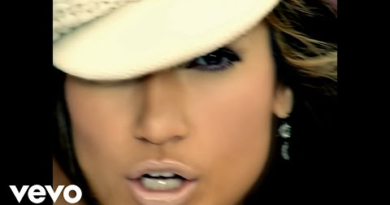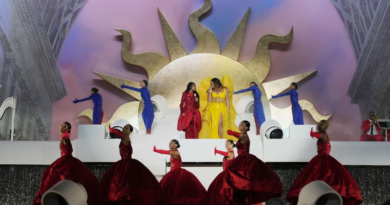Caroline Polachek Is the Indie Diva We Need Now
Backstage ahead of a Manchester concert that a reviewer would later call “an alternative-pop masterclass,” Caroline Polachek radiates calm. Despite the 38-year-old’s packed tour schedule and dark-walled surroundings, she appears well-rested and glowing, surrounded by an aura of light. (The fact that she’s resurrected her 2010s hairstyle, the one with the halo of sunbeam-like highlights, adds to the effect.) If this were a wellness-cult recruitment session as opposed to a Tuesday morning Zoom interview, I’d probably be writing to you now as a card-carrying member, urging you to join the Church of Caroline.
The fire and brimstone lighting up her current tour is the result of volcano-like set pieces, lighting tricks, and background animations, “but the smoke is real,” Polachek says, “and there’s a lot of it. I liked the idea of bringing precarity and unknowing into the stage set, how the band and I looked very small compared to this thing that might blow.”
The tour is in support of Polachek’s second solo studio album, Desire, I Want to Turn Into You, which came out in February to widespread acclaim (it held strong as the highest rated album of the year on Metacritic for months). Written during the pandemic lockdown as well as the in-between times while on tour with Dua Lipa in 2022, the album is a maximalist fever dream that evolves from claustrophobia to catharsis. The video for album opener “Welcome to My Island” features Polachek wailing from inside a cardboard box and a red dirt pit that may or may not be an active volcano.
More From ELLE

Later, she’s seen spewing lava from her mouth, casually swatting away giant glowing sperms, and cheerfully running on the beach holding the hoof of a mystery mythological beast who is just out of frame and apparently filming her. The song’s bridge, a spoken-word monologue, addresses her complicated relationship with her father, a scholar of Chinese history and musician who passed away in April of 2020 from the coronavirus. It’s delivered in a style that recalls Debbie Harry rapping and Kate Bush’s over-the-top expressiveness.
This content is imported from youTube. You may be able to find the same content in another format, or you may be able to find more information, at their web site.
“For me, the lyric ‘Welcome to My Island’ is a joke about ego and being trapped in your own head,” Polachek says. “I think of that song as like a really bratty, stupid, manic ego anthem, like, ‘Welcome to my world. I hope you like it. You’re not leaving.’ It’s just a joke about narcissism and ego, and the album unfolds from there, becoming increasingly open and empathetic and dealing with memory and the idea of what we get to keep and what we don’t. The album is not a narrative or concept album. There’s no storyline that runs through it. But one thing that does tie the sequence of tracks together, in a loose way, is that by the end of the album, the ‘self’ has completely dissolved. It ends with a group of children singing on my behalf. And it feels like this moment of release.”
Mid-pandemic, Polachek found herself in Sicily, not far from Mount Etna, the active volcano that features in the second season of White Lotus. “An amazing thing that came out of visiting Italy at that time was feeling so connected to this legacy of people dealing with chaos, whether it came in the form of economic chaos, political chaos, biomedical, or just the history of war and conquest and displacement and all the lore around Vesuvius,” she says. “I feel like Italian culture, both contemporary and ancient, has so many answers for dealing with chaos that come in the form of sensuality and humor and color and verve and passion—just this idea of ‘live for today, get on with it, move on, don’t dwell.’
“There’s a kind of hot-bloodedness that I thought made a really deep kind of sense. And I wanted to bring that zoomed-out perspective on where we’re at to the album, and not allow myself to indulge in this idea that this is a rare or unique moment in human history—that this has happened over and over and over again in various ways, and all of the superstition and anxiety, all of the snake oil, semi-wellness religious theories that were circulating over the last couple of years are just a part of human nature and human culture. I chose to not indulge in thinking that we were particularly special. It made me think a lot about vitality, and I wanted this record to feel extremely vital.”
During production rehearsals for her current tour, Polachek filmed the video for “Smoke.” “We’d set up the entire live show and were rehearsing an exact version of the show with a full crew for a few weeks to dial in everything from the light show to the sound mix to the choreography,” she says. “Production rehearsals are always a really psychedelic time, because you’re in this studio filled with fog and strobe lights for weeks. But it’s also, obviously, very expensive because you’re paying for the team and the equipment without making a profit the way you would during the shows. So I had this thought to do a dream version of the show and film it.” The process resulted in an epic, vintage-feeling concert film (and the cool BTS imagery illustrating this article).
This content is imported from youTube. You may be able to find the same content in another format, or you may be able to find more information, at their web site.
“Repetition is a really important part of the identity of this album,” says Polachek. “There are phrases in lyrics that repeat across the album, articles of clothing or song titles that turn up in different videos like little Easter eggs. So it felt within the language of the project to introduce the live show in the form of a music video. But it doesn’t look the way music videos look now. It looks the way music videos looked in, like, 1991, where you’d put a rock band in a studio and shoot them in a vibey way and call it a day. I was actually a bit nervous making a music video like that, but weirdly it had the most traffic of any video I’ve ever made. So I think people did respond to the physicality of it and maybe the realism of it as well.”
It’s easy to get swept up in the unbridled devotion that surrounds Polachek, whose Brooklyn synth-pop band Chairlift emerged at the height of late-aughties social media stan culture (and whose song, “Bruises,” soundtracked one of the era’s most memorable iPod commercials). Her subsequent solo work—and its accompanying campy choreography—ensured a seamless transition to TikTok virality (see: “So Hot You’re Hurting My Feelings”).
Fans will get a chance to see Polachek in the flesh for the remainder of the summer and fall with a series of festival dates in Europe and the U.S., including including next month’s inaugural Bleached Fest in San Diego and October’s III Points Festival in Miami.
“I feel really grateful that people, both critics and listeners, have been so down to go into all these different zones within one album and not see it as a conflict,” Polachek says. “I feel very emboldened by how understood the record was. Online, I was seeing people’s comments and their own interpretations of the songs, and I realized that what was important wasn’t that I was conveying my own vision, but that I was actually opening up people’s imaginations and letting them create, that I was giving people these portals or places in which they could project their own personal meanings and sensory imaginations.
“That for me is extremely exciting and fulfilling, and also to have cultivated a fan base that is very imaginative, creative, and open-minded. In that sense, I feel like this is where I’ve wanted to be my entire life and my entire career—to feel understood by a really creative group of dreamers.”
Melissa Giannini is the features director of ELLE.








